|
|
|
Sort Order |
|
|
|
Items / Page
|
|
|
|
|
|
|
| Srl | Item |
| 1 |
ID:
036533
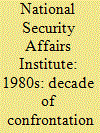

|
|
|
|
|
| Publication |
Washington, D C, Natonal defense University press, 1981.
|
| Description |
xxii, 312p.
|
|
|
|
|
|
|
|
|
|
|
|
Copies: C:1/I:0,R:0,Q:0
Circulation
| Accession# | Call# | Current Location | Status | Policy | Location |
| 022968 | 327.16828/NAT 022968 | Main | On Shelf | General | |
|
|
|
|
| 2 |
ID:
045976
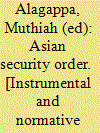

|
|
|
|
|
| Publication |
Standford, Standford University, 2003.
|
| Description |
xxv, 628p.
|
| Standard Number |
080474629X
|
|
|
|
|
|
|
|
|
|
|
|
Copies: C:1/I:0,R:0,Q:0
Circulation
| Accession# | Call# | Current Location | Status | Policy | Location |
| 046980 | 355.03305/ASI 046980 | Main | On Shelf | General | |
|
|
|
|
| 3 |
ID:
132917


|
|
|
|
|
| Publication |
2014.
|
| Summary/Abstract |
The Beagle Channel crisis (1977-1984) unfolded in a global political context. In other words, it was never solely a bilateral matter between Argentina and Chile, as many analyses have suggested. From the international arbitration to the participation of a third actor (the Vatican), the role of the United States, the Falklands war and the United Kingdom, the Beagle crisis had pronounced regional and international dimensions. Domestic structures and international conditions affected the Argentinian and Chilean foreign policies to different degrees. The Beagle crisis resolution has been explained by reference to the key role played by the Vatican. However, recently declassified US documents and interviews with key actors reveal a different story. International sanctions for human right violations were affecting both countries' leverage in the international community and creating internal political problems. This finding suggests that both countries were keen to use mediation as a strategy to remove human rights violations from the US agenda.
|
|
|
|
|
|
|
|
|
|
|
|
|
|
|
|
| 4 |
ID:
132032
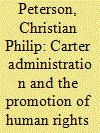

|
|
|
|
|
| Publication |
2014.
|
| Summary/Abstract |
This article will examine the effectiveness of the Carter administration's efforts to promote human rights in the Soviet Union. It will pay particular attention to how human rights promotion fit into a larger approach to transforming Superpower relations in ways favorable to U.S. interests called "reciprocal accommodation [détente]." The use of this framework provides an excellent way to tease out the complexities of how the administration balanced the promotion of human rights in the USSR with other important objectives such as concluding the SALT II treaty. It also helps reveal how executive branch worked to reduce Soviet human rights violations by citing the provisions of the Final Act and working with private citizens to raise international awareness about human rights issues. Without losing sight of his administration's inability to protect Soviet dissenters from arrest and harassment, this article will demonstrate that Carter had every intention of making the issue of human rights an important element of Cold War competition and implementing a new approach to détente that at least in part aimed at transforming Soviet internal behavior.
|
|
|
|
|
|
|
|
|
|
|
|
|
|
|
|
| 5 |
ID:
139283
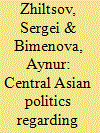

|
|
|
|
|
| Summary/Abstract |
This article analyzes the situation regarding the water resources of the transboundary rivers that developed in Central Asia after the collapse of the Soviet Union when the previous mechanism of mutual account of the interests of all the Central Asian republics broke down. Particular attention is given to studying the factors that have an impact on the formation and implementation of Central Asian politics regarding water use. A comparison is made of the international legal base that regulates conflicts involving the water resources of transboundary rivers and the legal documents of the Central Asian states. The paper analyzes the reasons for the failure to create a multisided mechanism for resolving the disputes that arise among the Central Asian countries with respect to water use of the transboundary rivers.
|
|
|
|
|
|
|
|
|
|
|
|
|
|
|
|
| 6 |
ID:
133093
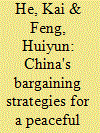

|
|
|
|
|
| Publication |
2014.
|
| Summary/Abstract |
Applying bargaining theory of international conflicts, we examine the successes and challenges of China's strategic choices in its ascent after the Cold War. We suggest that China needs to alleviate information and commitment problems in order to rise peacefully. Since 2008, China's "peaceful rise" strategy has faced serious challenges because of its "assertive turn" in diplomacy. We argue that China has not alleviated or settled these two problems successfully because of its ambiguous "core interest" diplomacy and undecided attitude regarding multilateral institutions in resolving the maritime disputes. China should engage in rule-based, institution building, such as a security community between China and ASEAN, to reinforce its peaceful rise commitments.
|
|
|
|
|
|
|
|
|
|
|
|
|
|
|
|
| 7 |
ID:
131004
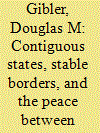

|
|
|
|
|
| Publication |
2014.
|
| Summary/Abstract |
Park and Colaresi find that border stability does not apply to non-contiguous states. This just confirms, again, an argument I have been making in numerous publications since my original "Bordering on Peace" article. Nevertheless, I use this response to present a replication of my original argument, as it applies to contiguous states, and I find strong support for the contention that the democratic peace can better be understood as a stable border peace. I also discuss several different replications of the original argument using different proxies for stable borders. Each confirms that joint democracy is not a statistically significant predictor of conflict once stable borders are also included in the model. In sum, arguments from the territorial peace have been confirmed in multiple analyses, with multiple data sets, using multiple levels of analysis, and this renders Park and Colaresi's attack on the original "Bordering on Peace" a non sequitur in the debate over stable borders as an explanation of democracy and peace.
|
|
|
|
|
|
|
|
|
|
|
|
|
|
|
|
| 8 |
ID:
129570
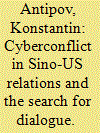

|
|
|
|
|
| Publication |
2014.
|
| Summary/Abstract |
The unprecedented escalation of conflict between China and the United States in cyberspace signals a definite crisis in Chinese-American relations. At the same time, the results from informal meetings between, Xi Jinping and Barak Obama in California on June8-9, 2013 show that the United States and China could possible move toward a new stage in their relations in the field of security.
|
|
|
|
|
|
|
|
|
|
|
|
|
|
|
|
| 9 |
ID:
127077
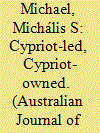

|
|
|
|
|
| Publication |
2013.
|
| Summary/Abstract |
Cyprus occupies an unenviable position among a group of intractable international conflicts which transcend their national borders and whose resolution has eluded third-party mediation. The Cyprus dispute has preoccupied theorists and practitioners of conflict resolution ever since the United Nations stationed its peacekeeping force on the island in 1964. Even attempts by the United Nations to revitalise the Cyprus talks following the 2004 referendum on the Annan plan have not yielded satisfactory results. For decades, the Cyprus problem has challenged conventional international analysis and defied traditional approaches to negotiation and peacemaking. This article grapples with the question of why this conflict has not been resolved despite endless negotiations. By extrapolating three seemingly distinct variables-Cypriotisation, Europeanisation and post-Kemalism-this article alludes to changes in the conflict's contextual parameters that are conducive to a political settlement.
|
|
|
|
|
|
|
|
|
|
|
|
|
|
|
|
| 10 |
ID:
046403
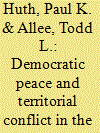

|
|
|
|
|
| Publication |
Cambridge, Cambridge University Press, 2002.
|
| Description |
xvii, 488p.
|
| Series |
Cambridge studies in international relations; no.82
|
| Standard Number |
052180115X
|
|
|
|
|
|
|
|
|
|
|
|
Copies: C:1/I:0,R:0,Q:0
Circulation
| Accession# | Call# | Current Location | Status | Policy | Location |
| 046464 | 341.42/HUT 046464 | Main | On Shelf | General | |
|
|
|
|
| 11 |
ID:
132022
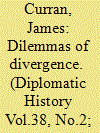

|
|
|
|
|
| Publication |
2014.
|
| Summary/Abstract |
In the period from December 1972 until November 1975 the US-Australia alliance faced its greatest ever crisis. In the hands of President Richard Nixon and Australian Prime Minister Gough Whitlam, a relationship that had endured the heights of the Cold War veered dangerously off course and seemed headed for destruction. For Whitlam the world emerging from the ashes of Vietnam offered an exciting opportunity to recast Australia's image in the eyes of the world and redefine the alliance. For Nixon, the ongoing difficulties in securing an end to the war and the mounting pressures of the Watergate scandal produced a visceral reaction to any criticism-but especially that from once close and trusted allies. In his rage he threatened to rip apart the very fabric of the alliance, asking that options be explored for pulling out top secret U.S. intelligence installations in Australia and ending all intelligence sharing. In Australia, although some saw Whitlam as the great modernizer of Australian foreign relations, others feared he was recklessly endangering the protective umbrella provided by the United States.
|
|
|
|
|
|
|
|
|
|
|
|
|
|
|
|
| 12 |
ID:
137719


|
|
|
|
|
| Summary/Abstract |
We do not yet have strong evidence that the rally effect motivates domestically vulnerable leaders to become engaged in international conflict. We draw upon mechanism design to argue that, if anything, diversionary incentives should be associated with a greater likelihood of being the target of disputes, though the conditions under which the result obtains are restrictive. Our analysis of all dyad-months involving the United States and its rivals for the period from 1956–1996 yields suggestive evidence of the unconventional behavior anticipated by our model, while failing to find evidence of patterns anticipated by either traditional diversionary accounts or strategic conflict avoidance. These results suggest that if we are to better understand international conflict by focusing on diversionary incentives, which may not be very useful, we should focus on the behavior described by our formal model rather than that anticipated by either traditional diversionary accounts or strategic conflict avoidance.
|
|
|
|
|
|
|
|
|
|
|
|
|
|
|
|
| 13 |
ID:
118176


|
|
|
|
|
| Publication |
2012.
|
| Summary/Abstract |
Audience costs are a central feature of many prominent theories of international conflict. We advance the understanding of audience costs by specifying the domestic institutions necessary to generate them. In our conceptualization, audience cost capacity (ACC) is a function of the availability of alternative rulers and the cost of mobilizing against the incumbent. This conceptualization leads to the first measure of ACC that has variation between more and less democratic political systems and variation within autocracies. We subject our measure to a rigorous set of tests that includes addressing selection effects and temporal treatment effects, neither of which have been fully examined in this research area. The empirical analysis offers strong support for the validity of our measure.
|
|
|
|
|
|
|
|
|
|
|
|
|
|
|
|
| 14 |
ID:
124867
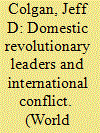

|
|
|
|
|
| Publication |
2013.
|
| Summary/Abstract |
There is a strong scholarly consensus that domestic revolutions create conditions ripe for international conflict. Traditionally scholars have treated revolutions as events, after which there is a period of time during which international conflict is more likely. Yet some states experience significant international conflict only during and in the immediate aftermath of a revolution, whereas other states continue to engage in conflict for many years and even decades afterward. This article seeks to explain the persistence of conflict for some but not all revolutionary states by differentiating the concept of revolutionary leaders from that of revolutions as events, both theoretically and empirically. The author shows that existing theories linking revolution to international conflict underemphasize an important mechanism through which revolution leads to conflict: by selecting conflict-prone leaders through the dynamics of revolutionary politics. He argues that revolutionary politics allow leaders with certain characteristics, including high risk tolerance and strong political ambition to alter the status quo, to obtain executive office because individuals without these characteristics generally do not succeed in leading revolutions. Having obtained power, revolutionary leaders have aggressive preferences that make their states more likely than nonrevolutionary states to instigate international conflict.
|
|
|
|
|
|
|
|
|
|
|
|
|
|
|
|
| 15 |
ID:
131425
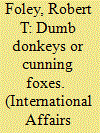

|
|
|
|
|
| Publication |
2014.
|
| Summary/Abstract |
The idea that the armies of the First World War were incapable of learning is one of the most enduring myths of the conflict. This image of 'lions led by donkeys' has proved difficult to modify, despite the sizeable scholarly literature on the tactical, technological and organizational adaptation and innovation undergone by all armies during the war. By examining the British and German armies as learning organizations during the war, this article contributes to the growing literature on wartime adaptation and innovation, as well as the wider literature on organizational learning in wartime. It demonstrates how the organizational cultures of these two armies shaped the way in which they learned, predisposing the British army towards radical, often technological, solutions to the tactical and operational challenges of the First World War battlefield, while inclining the German army towards incremental and tactical solutions to the same problems.
|
|
|
|
|
|
|
|
|
|
|
|
|
|
|
|
| 16 |
ID:
132027
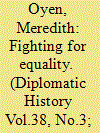

|
|
|
|
|
| Publication |
2014.
|
| Summary/Abstract |
An early battle in the war to gain greater equality for China on the international stage emerged in an unexpected place: Aboard ships around the world sailing for the Allied Merchant Marine. During the Second World War, at least twenty thousand Chinese seamen worked on mostly British ships. Chinese worked long hours, received lower wages than white sailors engaged in the same work, were never given the war risk bonus offered to keep other members of the crew on duty during periods of high risk, and were routinely denied shore leave at U.S. ports on the grounds that they posed a flight risk. In response, Chinese seamen deserted in uniquely high rates, en masse instead of one individual at a time. The nature and scope of the desertions threatened the success of the supply operation, leading the governments involved to come together to try to prevent them.This article explores the multilateral negotiations that endured as long as the war itself. These centered upon three of the most basic inequalities endured by Chinese sailors-unequal pay, lack of war risk bonuses, and lack of shore leave. Using government records from all three parties (the United States, Great Britain, and the Republic of China) as well as press and collections from private organizations, I demonstrate the ways in which racial inequalities ingrained in the international system hindered advances for the Chinese seamen, challenged the smooth management of both Anglo-Chinese and Chinese-American relations, and sparked conflict between the Nationalist Chinese government and the seamen themselves. The legacies of British colonialism in Asia and American exclusion of Chinese combined with wartime public opinion to push forward changes when international union efforts failed.
|
|
|
|
|
|
|
|
|
|
|
|
|
|
|
|
| 17 |
ID:
132015
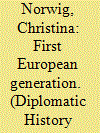

|
|
|
|
|
| Publication |
2014.
|
| Summary/Abstract |
This article explores the central role of youth in the process of European integration. Analyzing the sources of the European Youth Campaign, an international program implemented by the European Movement in the fifties, it focuses on the symbol of youth in discourse on European integration, as well as on the historical agency of young people. After World War II, Europeans conceptualized a future united Europe in terms of "youthfulness" to distinguish the new era from the continent's violent past. Young people also referred to the traditional "myth of youth" in their statements and actions. By staging themselves as a "first European generation," they staked claims to agency in the process of building a new united Europe. Various examples of youth projects reveal the actual role of young people as historical agents and show how the politics of European integration and the Cold War played out at a grass-roots level. With their participation, young people not only helped to constitute the prevailing power constellations; they also challenged them.
|
|
|
|
|
|
|
|
|
|
|
|
|
|
|
|
| 18 |
ID:
143060
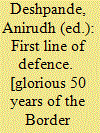

|
|
|
|
|
| Publication |
DelhI, Shipra Publications, 2015.
|
| Description |
xiv, 288p.hbk
|
| Standard Number |
9788175418417
|
|
|
|
|
|
|
|
|
|
|
|
Copies: C:1/I:0,R:0,Q:0
Circulation
| Accession# | Call# | Current Location | Status | Policy | Location |
| 058439 | 355.3/DES 058439 | Main | On Shelf | General | |
|
|
|
|
| 19 |
ID:
124395
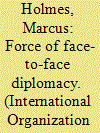

|
|
|
|
|
| Publication |
2013.
|
| Summary/Abstract |
Face-to-face diplomacy has long been the lynchpin of international politics, yet it has largely been dismissed as irrelevant in theories of cooperation and conflict-as "cheap talk" because leaders have incentives to dissemble. However, diplomats and leaders have argued for years that there is often no substitute for personally meeting a counterpart to hash out an agreement. This article argues that face-to-face diplomacy provides a signaling mechanism that increases the likelihood of cooperation. Face-to-face meetings allow individuals to transmit information and empathize with each other, thereby reducing uncertainty, even when they have strong incentives to distrust the other. The human brain has discrete architecture and processes devoted to parsing others' intentions via cues in face-to-face interaction. These processes enable actors to directly access the intentions of others with a higher degree of certainty than economic and game-theoretic models of bargaining predict.
|
|
|
|
|
|
|
|
|
|
|
|
|
|
|
|
| 20 |
ID:
073577
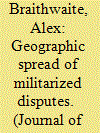

|
|
|
|
|
| Publication |
2006.
|
| Summary/Abstract |
A thriving literature investigates the claim that geographic processes cause military conflict to cluster and diffuse. With the recent update of the Militarized Interstate Dispute (MID) data and the collection of geographic locations to accompany these data, it is now possible to offer a location-based examination of the geographic spread of conflict. Consideration of the literature that identifies a role for physical geography in conflict processes leads to the derivation of hypotheses in which territory and resources are expected to provide incentives for states to seek to increase territorial acquisitions, while impassable terrain is expected to act as a barrier to such spread. These hypotheses are tested using ordinary least squares (OLS) estimation - regressing the spread of individual MIDs in the years 1993-2001 upon a range of location- and dispute-specific variables. These regressions demonstrate that the spread of individual disputes is a function of the issue over which they are fought, the presence of vital resources in the host country, the prevailing terrain of that country, and the relevant conflict history of the participants. It is argued that knowledge of the precipitants of the spread of individual conflicts is of great benefit to policymakers seeking to mitigate the detrimental impact of conflict upon the societies in which it occurs, as well as to those deploying peacekeeping troops to conflict zones.
|
|
|
|
|
|
|
|
|
|
|
|
|
|
|
|
|
|
|
|
|